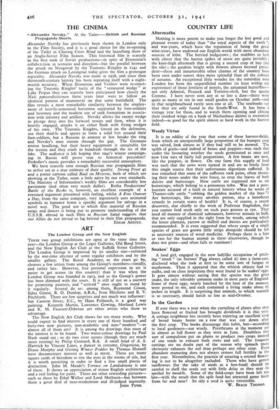THE CINEMA
4$ Alexander Nevsky." At the Tatler—British and Russian Propaganda Shorts.
Alexander Nevsky has previously been shown in London only to the Film Society, and it is a good choice for the re-opening of the Tatler in Charing Cross Road and the launching there of an Anglo-Soviet Film Season. This historical film is scarcely in the first rank of Soviet productions—in spite of Eisenstein's collaboration in scenario and direction—but the parallel between the attack on Novgorod by the Teutonic Knights in 1242 and the German attack on Leningrad today gives the film a grotesque topicality. Alexander Nevsky was made in 1938, and since then thirteenth-century history has been repeating itself with a night- marish accuracy. When Eisenstein and Vasiliev were re-enact- ing the Teutonic Knights' tactic of the " armoured wedge " at Lake Peipus they can scarcely have anticipated how closely the Nazi panzerdivisionen three years later were to follow an identical pattern of manoeuvre on that same battlefield. The film reveals a most remarkable similarity between the employ- ment of heavily-armoured horsemen supported by foot-soldiers and bowmen and the modern use of tank formations in associa- tion with infantry and artillery. Nevsky allows the enemy wedge to plunge deep into his forward troops and then, when it is heavily engaged, attacks it on either flank with flying wedges of his own. The Teutonic Knights, forced on the defensive, use their shields and spears to form a solid fort around their foot-soldiers, but a Russian in armour at last breaks the ring and Nevsky's men stream through the gap. The Germans retreat headlong, but their heavy equipment is unsuitable for the terrain and they crash in hundreds through the ice of the lake. The audience is left hoping that 1941's winter campaign- ing in Russia will prove true to historical precedent! Prokofiev's music provides a remarkably successful atmosphere.
We have scarcely seen enough Russian war propaganda films to arrive yet at a true estimate of their quality. Strong Point 42 and a poster cartoon called Raid on Moscow, both of which are showing at the Tatter, seem a little naive by our own standards. The Ministry of Information's weekly films are considerably less passionate (and often very much duller). Rotha Productions' Battle of the Books is, however, an excellent example of a reasoned argument presented with feeling, whilst A Few Ounces a Day, from the same company, very ingeniously uses animated symbols to hammer home a specific argument for salvage in a novel way. The good use to which film material of Russian songs and dances is being put to promote understanding of the U.S.S.R. abroad in such films as Russian Salad suggests that our Allies do not intend to lag behind in their film propaganda.
EDGAR ANSTEY.






















 Previous page
Previous page